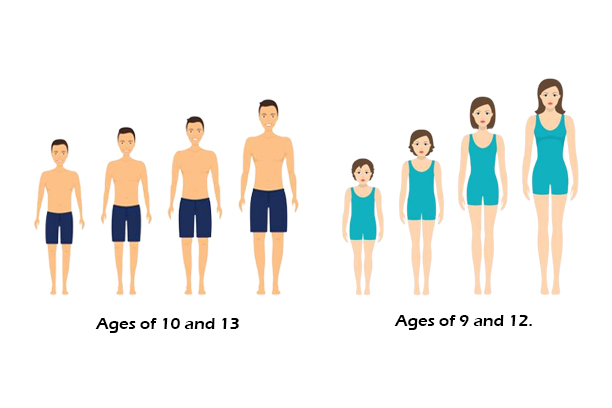Make an Appointment
The physical changes that occur during the preteen and adolescent years are known as puberty (
Adolescence
). It alludes to the changes in physical appearance that take place during adolescence. Additionally, adolescents go through cognitive and psychosocial growth. In puberty, adolescents can go through puberty disorders, changes and transitions.
The development of secondary sex traits and an increase in size are the two most obvious changes that occur throughout puberty. Alterations in body composition, fertility, and most body systems (such as bone, with accelerated growth and mineralization), as well as the development of the brain and cardiovascular system, are all profound changes (with greater aerobic power reserve, electrocardiographic changes, and blood pressure changes). The bodies of both boys and girls, grow taller and resemble adult bodies the most during puberty.
Hormones in the body are what lead to puberty. These hormones are produced by the brain, as well as the ovaries and testicles in males and females, respectively. “Estrogen” is a hormone produced by the ovaries. A hormone called “testosterone” is produced by the testicles. Numerous alterations in the body are influenced by oestrogen and testosterone.
Different youngsters experience the onset of puberty at various ages. Typically, girls begin puberty between the ages of 9 and 12. Generally, boys begin puberty between the ages of 10 and 13. However, kids can begin puberty before or beyond these dates. The precise age at which a child enters puberty is influenced by a number of variables, including genetics, diet, and weight.
Early or delayed puberty and other pubertal issues might be problematic. In addition to this, a lot of ladies struggle with menstrual problems including painful periods, heavy bleeding, etc. The obstacles faced by the patient and family as a result of puberty’s complications are numerous. Anaemia, gynecomastia, acne, psychosocial aspects of adolescence and irregular uterine haemorrhage are some of these health problems.
Parents’ painful recollections of going through puberty themselves are frequently brought up by having an adolescent. Fortunately, there is a growing trend toward education and support for adolescents during this time in their lives. Teenagers nevertheless want parental reassurance that puberty brings about identical changes for everyone as well as information about what to expect. Puberty can be an imaginative and affirming stage of life for teenagers when they receive encouragement.
Talking to your child before the onset of puberty is beneficial. Tell them what bodily changes to anticipate and that they are common. Parents should provide emotional support through puberty disorders, changes, and transitions.
Adolescents frequently pay close attention to how their growth stacks up against that of their companions. Any development that deviates greatly from the norm might cause extreme anxiety in addition to difficulties on the social and emotional levels.
Treatment for pubertal issues should begin as soon as possible. When the disease is expected to get better on its own, treatment options may include observation and routine examinations, pharmacological therapy, and counselling to assist kids and families deal with the emotional and social difficulties associated with puberty disorders.


One Comment
Pingback: Puberty: Puberty Disorders, Changes, and Transitions – Sujata Birla Hospital